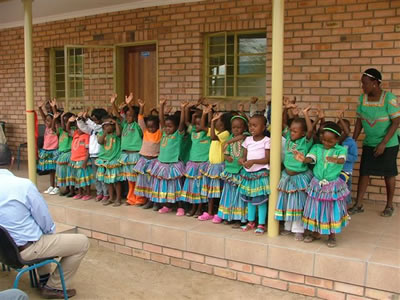With the lack of access to quality education cited by the African Development Bank and the Global Competitiveness Report as one of South Africa’s biggest stumbling blocks in accelerating economic development, there has been a high level of local interest in the expansion of Phalaborwa’s ilNhlangasi Day Care Centre.
The early learning centre has doubled the size of its teaching area in a R600 000 expansion programme. Completed in October, it means educational programmes for the close on 100 learners can be far better streamlined. Since its opening in 2005, the children have been taught from a single classroom, and informally grouped according to age. With two quite separate classrooms now, teachers can focus more efficiently focus on age-appropriate activities.
The ilNhlangasi team of six teachers equips the children, who range in age from toddlers to pre-primary schoolers, with the building blocks they will need when they enter the formal schooling system. Many are already familiar with the alphabet by the time they enter primary school.
Principal of the centre, Sestina Mokgalaka says the local community is extremely proud of the new facility. “It makes my staff and me very happy. This initiative will make us as a community, big and strong.”
The extension of the centre was funded by the not-for-profit Amarula Trust that has also donated ten desk top computers, toys and a photo-copying machine to support the local educational initiative. The computers have been installed at the primary school to which the early learners will go, when ready.
Berco donated all the logistical support, as well as food, while advertising agency draftFBC Cape Town donated a series of educational posters.
Says the trust’s Rory Viljoen: “Many of the learners are the children of the women who harvest the marula fruit from which we make Amarula. By exposing these children in a more ordered way to foundational educational activities, the centre hopes to give them a head start in life.”
Viljoen says internationally, educationists concur that the foundation for a stable society includes early learning, where children are exposed to problem-solving, intellectual, physical and creative pursuits from a very young age. Research has shown that one of the most critical impediments to successful formal learning and the development of life skills is a lack of early-learning stimuli through games, story-telling and physical play.





